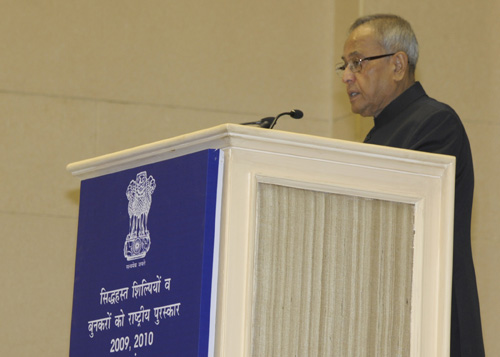
It is indeed a happy occasion for me to be amongst you today for presenting the National Awards, Shilpguru Awards and Sant Kabir Awards for the years 2009 and 2010 to the Master Crafts persons and Weavers.
I congratulate all the awardees present for their contribution in preserving, promoting and enriching the traditional and cultural heritage of our country. I am confident that this recognition for your workmanship shall inspire and encourage others to work hard and emulate your efforts to bring prosperity to artisans and weavers across the country.
Handlooms form a precious part of our national legacy. This rich heritage has been kept alive by those professionally skilled weaver households that are linked with the age-old tradition of weaving. Weavers with their skillful blending of myths, faiths, symbols and imagery provide their fabric an appealing dynamism. The strength of handloom lies in innovative designs, which cannot be replicated by the machines.
Every part of India, every province, district and almost every single village has a cherished craft tradition of its own. Working on a variety of raw materials ranging from hard objects like stone and metal to soft sandalwood and clay, our craftpersons create objects of great beauty. What is notable is that these objects of beauty are also an integral part of the life rhythms of our people. Be it the great Teracotta of Bankura and embroideries of West Bengal; the stone sculptures of Mamallapuram, Ellora and of Konark, the world-famous bronzes of the south, the intricate cane and bamboo objects made in our North-East, all of them represent the collective ethos of our civilization. They represent our commitment to excellence and to a higher aesthetic sense that has marked our artistic endeavors down the ages.
Relevance of handicrafts in today's India is not confined to its great romance with our history and civilization. The fact that more than 6 million persons still practice the crafts, demonstrates the importance this sector assumes in our national economy. A major part of our rural populace derives their livelihood from home and cottage based activities like Handicrafts and Handlooms.
With our agricultural sector already overburdened, the role of handicrafts and handlooms for generating income and employment cannot be over emphasized. The strength of the handlooms sector lies in its uniqueness, flexibility of production, openness to innovations, adaptability to the supplier's requirement and the wealth of its tradition. Competition from power loom and mill sector, availability of cheaper imported fabrics, changing consumer preferences and alternative employment opportunities however threaten the vibrancy of handloom sector.
There is a need to be aware of the emerging challenges and also the opportunities presented by the changing global environment. A focused approach has to be adopted maximizing the opportunities and strengths inherent in the situation. We have to adapt to the changes that are taking place not only within the country but also globally. Modernization in the weaving technique, improvement of designs and pattern, access to modern tools, technology and implements, upgradation of skills to ensure quality, supply of good quality basic inputs like yarn, dyes and chemicals in time and to create a sound marketing infrastructure would not only give the required impetus but also make the products of the weavers and craftpersons more competitive.
Simultaneously, the Government needs to provide enabling policy support which promote sustainable growth of these two important sectors of our economy.
The Indian economy is passing through testing times on account of recent slowdown in the world economy as a whole. The slow down has affected many sectors. The Handlooms and Handicrafts sectors derive their sustenance predominantly based on human inputs, which are not easily replicable by machines. Herein lies the Unique Selling Proposition (USP) of our exquisite handlooms and handicrafts products. To fully harness the inherent potential of our artisans and weavers, we need to constantly endeavor to get them access to markets within India and abroad.
Conferring of awards today is not, therefore, a mere ritual but a humble way to recognize the outstanding contribution made by the weavers and craftpersons of India to fostering creativity and bolstering the economy of our country.
I hope when you go back to your homes you will carry a ray of hope to your fellow artisans and weavers. You will function as torch bearers to guide them to reach the pinnacle in pursuit of their respective crafts so that one day they too could be the proud winners of such awards.
I take this opportunity to once again congratulate all the craftsmen and weavers who have won Awards and convey my best wishes to them for success in all their future endeavours.
JAI HIND
